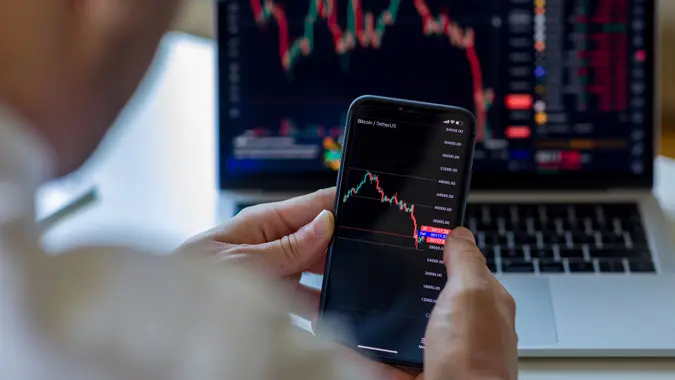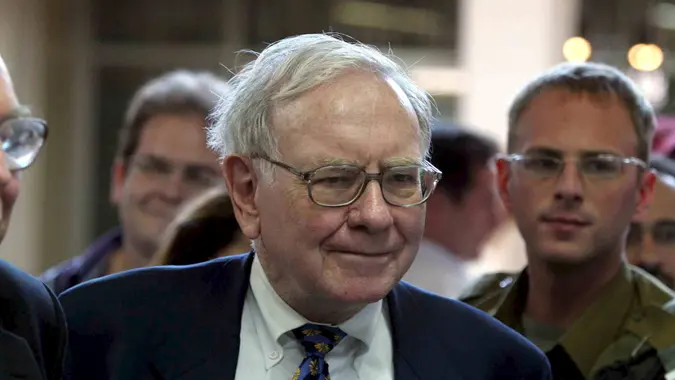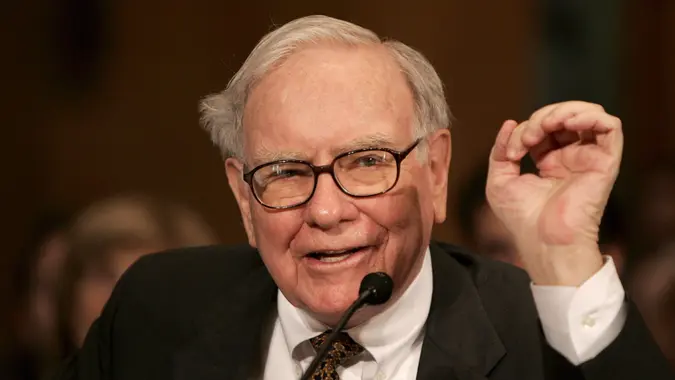Futures vs. Options Trading

Commitment to Our Readers
GOBankingRates' editorial team is committed to bringing you unbiased reviews and information. We use data-driven methodologies to evaluate financial products and services - our reviews and ratings are not influenced by advertisers. You can read more about our editorial guidelines and our products and services review methodology.

20 Years
Helping You Live Richer

Reviewed
by Experts

Trusted by
Millions of Readers
Entering the investment world, you may hear words like options, futures and stocks thrown around casually. Beginners, though, are often unfamiliar with the concepts these words refer to.
Options and futures are two investment types that can earn you a high return on investment. While options get you a contract with the “right” to buy or sell an asset, futures actually obligate you to buy or sell that asset.
However, this is not the only difference between these two investment types. In this guide, we conduct a futures vs. options comparison, discussing their similarities and differences.
What Are Options?
As their name indicates, stock options give you the “option” or the “right” to buy or sell a stock at a particular time at a specific price. You are not obligated to purchase or sell the stock or asset if you do not want to.
Since options are derivatives of an underlying investment, such as a stock, they do not give your ownership of this asset unless you have finalized the agreement to purchase that asset.
To acquire an option, you have to pay a premium reflecting a hundred shares of the stock or underlying commodity.
Put and Call Options
You can invest in two kinds of options: put and call options. A put option allows you to sell an asset at a certain price in a specific time frame, while a call option lets you buy an asset at a certain price in a specific time frame.
Suppose you get a call option to purchase a stock at $100 in the next four months. The current price of the stock is $90. If the stock reaches $110, you can buy it at $100 as per your right.
Then you can sell this stock and earn a $10 profit. However, if the stock does not reach $100 in four months, the option is worthless. Therefore, you cannot trade it and your upfront payment is unrecoverable.
An Example
Put options are the inverse. Suppose you get a put option to sell a stock at $100. The price of the stock then falls to $90, so you can buy it at that price and immediately resell it for $100, profiting $10. Again, if the designated window of time on an option expires, it becomes worthless and you’re left without a way to recover your upfront investment.
Why Choose Options?
Options have the following features:
- They are cost-efficient since a smaller investment can earn you high returns.
- They are risky as compared to bonds but can be safer than equities.
- Options let you earn high rewards in short time periods, generally on the order of months.
What Are Futures?
Futures are contracts like options, except that investors are obligated to buy or sell an asset at the predetermined date. The contract is between two parties, one agreeing to buy the asset while the other is obligated to sell it.
Unlike options, both parties are obligated to make the transaction. The purchase and sale go through irrespective of the current market price. Both parties enter the contract for mutual gain:
- The seller wants to hedge their risks by setting a specific price for the asset to ensure they do not suffer a loss if the market price goes down.
- Meanwhile, the buyer hopes the asset’s market price goes up so that they can earn a profit through futures trading.
Suppose two traders get into a futures contract for an asset priced at $100 in three months. Currently, the price of the asset is $80. The seller wants to guarantee a $20 profit irrespective of upcoming price fluctuations.
On the other hand, the buyer hopes the price goes over $100 so that they can resell that asset. Whatever happens to the price of the asset, both parties are obligated to carry out the transaction at the established time.
Trading Futures vs. Options: What Are the Similarities?
Both futures and options are derivative investments, which means they get their value from underlying assets, such as stocks. However, they also differ in some regards:
Liability
In options trading, liability is asymmetrical. Whoever’s sold the option has given a lot of leverage to the person they’ve sold the option to, since they may execute the option and compel the seller to make an unfavorable trade, depending on market shifts.
Futures have symmetrical liability; one party will see a return equivalent to the other party’s loss.
Expiration Date
The futures contract specifies a date on which the transaction must take place. The buyer or the seller cannot transact before this date.
On the other hand, the expiration date in an options contract specifies a time frame. It is the latest date by which the contract owner can exercise their right. They can also do it any time before that particular date.
Trading Futures vs. Options: How To Choose
Options are ideal for people who want a certain level of flexibility since they do not obligate you to transact. Also, with options, you’ve only committed the initial money down, as opposed to the full cost of the trade.
If you decide not to execute the contract then, regardless of the swing in an asset’s price, your losses will remain constant. Options are also easily accessible on trading platforms, unlike futures contracts.
On the flip side, futures are suitable for investors who want to invest in alternative commodities to expand their portfolios. Remember that an option’s value declines with time while futures do not experience this time decay.
Also, futures are relatively liquid, so it is easy to sell them in the open market. If these are the features that attract you as an investor, futures contracts are your best bet.
Final Take
Both futures and options come with high risks due to their unpredictability. Moreover, the speculative nature of these investment tools may make them unsuitable for beginners.
Considering the high volatility, we recommend you only get into these contracts if you have some investment expertise and a high tolerance for risk.
Our in-house research team and on-site financial experts work together to create content that’s accurate, impartial, and up to date. We fact-check every single statistic, quote and fact using trusted primary resources to make sure the information we provide is correct. You can learn more about GOBankingRates’ processes and standards in our editorial policy.
- Charles Schwab. "What Are Futures in Trading?"
 Written by
Written by  Edited by
Edited by 

























